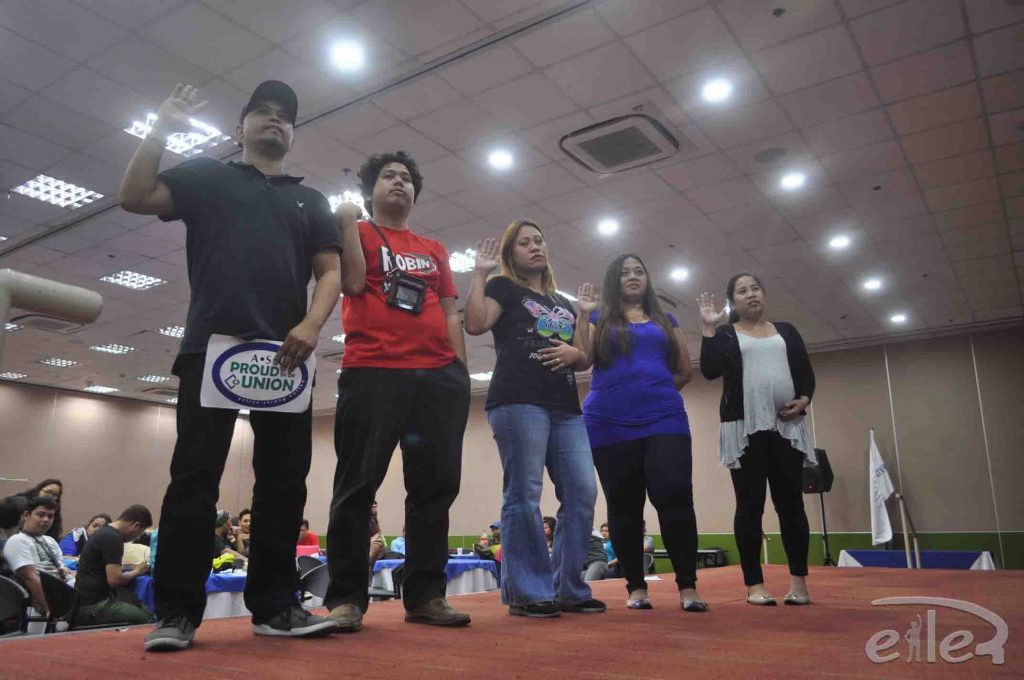EILER calls on IT-BPO companies to respect and uphold employees’ rights and welfare.
Touted by the government as the country’s “sunshine industry,” the Information Technology – Business Process Outsourcing (IT-BPO) is widely perceived as a boost to the country’s economic growth and employment. However, little is reported about the alarming labor conditions inside the workplaces.
There is only one union in the Philippine IT-BPO industry. The Unified Employees of Alorica made history when it was established in 2015 with the help of BPO Industry Employees Network (BIEN). The union was already registered in the Department of Labor and Employment since March 2015, yet Alorica (formerly West Contact Services Corporation) had continuously and purposefully denied the employees’ right to unionize through revocation of the union’s registration. According to UEA President Sarah Prestoza, Alorica even systematically targets the unionized employees, harassing them through charging of workplace cases such as fraud, call avoidance, and gross negligence of duties.

MANILA – Officers of Unified Employees of Alorica (formerly West Contact Services Corporation) pledged to the first ever union in Philippine IT-BPO industry. The breakthrough oath taking was held at the Roof Deck Auditorium of Makati Medical Center on March 28, 2015. Photo by Rochelle Porras.
Seeing through the hype:
-
BPO employment in 2011 stood at 640,000 or merely 1.7% of total employed according to the Bureau of Labor and Employment Statistics (BLES). At the end of 2016, employment is estimated at 1.5 million jobs, and is considered as “fastest growing” and “dynamic” by the Philippine government.
-
However, 34% of BPO employees are non-regular. That’s 1 out of 3 employees. Gaining regular employment status does not guarantee employees their security of tenure since companies can easily fire them based on alleged dismal performance, absences, and trumped-up violation charges.
-
Major offshoring and outsourcing players in the Philippines are mostly giant US-owned corporations serving US client companies. They have a strong lobbying group that had pushed for legislation in favor of these corporations. The Information Technology and Business Process Management Association (IBPAP), the largest association of IT-BPO companies in the country, had launched the IT-BPM Road Map for 2016-2022 paving the pro-capitalist direction of the industry for the next six years. Moreover, IBPAP wanted to keep the exemption of certain sales and imports from the value-added tax (VAT),
-
Based on EILER’s 2008 research on BPO employees, 45% of respondents earn a monthly salary of only P10,000-P15,000, while 36% earn P15,000-P20,000. Almost a decade after, not much has changed. Despite the influx of foreign investment to the country from IT-BPO corporations, the employees still earn roughly the same ($200-250 or less) for up to 11-hour workday with no additional incentives.
-
IT-BPO hubs are located inside Special Economic Zones enjoying tax incentives and voluntary (instead of mandatory) compliance to acceptable and fair labor standards. These provisions are governed under the Implementing Rules and Regulations of Philippine Economic Zone Authority (PEZA) otherwise known as the Special Economic Zone Act of 1995. Income Tax Holiday (ITH) provision exempts the firms from payment of corporate income tax of up to 100% for 4 years (non-pioneer) and 6 years (pioneer firms). By simply changing their registered business name, these outsourcing firms can instantly avail another four to six years of tax holiday. PEZA is an attached agency of the Department of Trade and Industry (DTI).
-
In January 2017, Undersecretary Ceferino S. Rodolfo announced that 2017-2019 Investment Priorities Plan (IPP) shall no longer grant income tax holiday to IT-BPO by 2020 unless they will (re)locate outside of Metro Manila. DTI asserts that this would generate employment opportunities in the provinces. The current regional setup of wages however ensures that each region outside of Metro Manila has a lower minimum wage set by the Regional Tripartite Wages and Productivity Boards (RTWPBs), an attached agency of the Department of Labor and Employment (DOLE).
-
Filipino team leaders, supervisors, managers and senior managers are paid 36% to 57% less than their counterparts in China, India, Malaysia and Vietnam.
-
According to the International Labour Organization (ILO), 4 out of 10 BPO employees in the Philippines suffer from occupational safety and health concerns such as sleep disorders, fatigue, eye strain, etc.
-
Information technology and business process management is a term used by lobbying groups and corporations to deceive the public and camouflage the real hidden cost of IT and business offshoring and outsourcing.
EILER’s BPO research began in 2008. For a compilation of researches on the industry, please visit the Resources page. Read the BPO Briefer.

Makati Central Business District. Photo by Manilaspirit shared under Creative Commons Attribution 3.0.
Know your rights!
Every employee shall have “the right to assert for the protection of their rights and the promotion of their welfare” (Sec. 18 Art. II Phil. Constitution). These rights are granted to us by virtue of being employees, regardless of association with a union or not.
EILER, with the support of People with a Mission, has published a small flyer informing BPO employees of their basic rights as part of the “Kaagapay” project.
To view and download the Know Your Rights! flyer, please click here.
